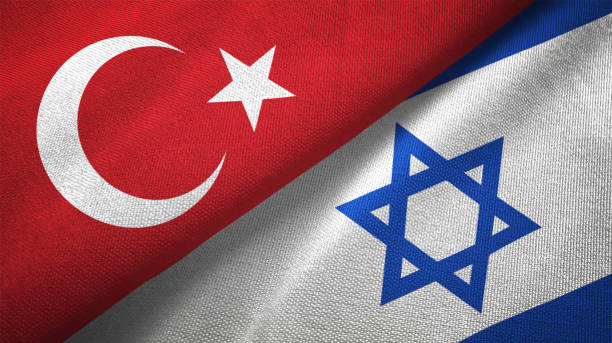Türkiye and Israel enjoyed good relations for decades. The coming to power of the AKP in 2002 introduced an element of uncertainty into the relationship. However, there was no major disturbance until the “one-minute” incident at the World Economic Forum in Davos on January 30, 2009, where Prime Minister Erdoğan, in the presence of President Shimon Peres, strongly denounced Israel for its attitude toward the Palestinians. This marked the beginning of the downturn.
The Davos incident was followed by the “Mavi Marmara” tragedy in May 2010. A Turkish NGO organized a flotilla to take humanitarian assistance to Gaza in defiance of the Israeli maritime blockade. Israel warned them that it would not allow this, but the organizers were determined. The Turkish government chose to let the initiative run its course. Finally, Israeli Defense Forces (IDF) boarded the flagship of the flotilla, Mavi Marmara, and killed nine Turks. Diplomatic representation in Ankara and Tel Aviv was brought to the lowest level.
Two years ago, Türkiye and Israel started “normalizing” relations. In March 2022 President Herzog visited Ankara. Last August Israel and Turkey announced that they were restoring full diplomatic ties. Soon after, ambassadors arrived in Ankara and Tel Aviv.
What had changed? Israel’s attitude toward the Palestinians? Israel’s designation of Hamas as a terrorist organization? Nothing had changed. But as Türkiye’s relations with Arab countries and Israel soured, Israel had succeeded in establishing diplomatic relations with the UAE, Bahrain, Sudan, and Morocco. Ankara’s policy of “precious loneliness” was at a dead-end.
On November 24, 2021, Sheikh Mohamed bin Zayed, Crown Prince of Abu Dhabi visited Ankara. In February 2022, President Erdogan visited the UAE for the first time in nearly a decade to revive relations. He said, “We are planning to take steps that will bring relations back to the level they deserve.”
Indeed, these two visits were about restoring a broken relationship. What took the relationship to unprecedented lows was AKP’s unreserved support for the Muslim Brotherhood and the UAE’s fight against it. Thus, Türkiye’s pro-government media directed the harshest criticism at the UAE for supporting FETO.
Our relations with Egypt soured exactly for the same reason: Ankara’s unreserved support for the Muslim Brotherhood. For years the Turkish-Egyptian relationship had remained on the right track. Cairo saw itself as the Arab world’s leader and sometimes perceived Ankara as a regional competitor, whereas Türkiye had no inhibitions to expanding cooperation. It was the right approach benefiting both sides.
The Arab Spring, the fall of President Mubarak, the election of Mohamed Morsi as President, and his ouster changed everything. The AKP government was outraged. In June 2019, after Morsi’s death, President Erdogan said, “The late Morsi was tried and sentenced to death by the coup courts and drew his last breath in a courtroom again, which is a symbol of the years of long persecution against him and his people. The oppressors may make attempts against the lives of the oppressed and may even lead them to be martyred, but they can never harm the glory of their struggle.”
For the last two years, there have been signs of a thaw, but the full “normalizing” of relations with Cairo would take time. What has changed? Again, nothing. But, in the meantime, Egypt, Israel, Greece, Cyprus, Italy, and Jordan established the East Mediterranean Gas Forum. And the Rabia sign, a symbol of support for the Muslim Brotherhood in Türkiye was sent into oblivion.
Nearly four years after the murder of Jamal Khashoggi, President Erdogan visited Saudi Arabia to make peace with MBS who soon returned the visit. Thus, relations were “normalized”. Are they, really?
The foregoing only shows the roller-coaster pattern of Turkish foreign policy over the last fifteen years. Unfortunately, there are other examples, the most appalling one being President Assad of Syria turning from a great friend to Ankara’s archenemy in no time triggering a massive wave of Syrian refugees into Türkiye. Every country can make reasonable adjustments to its foreign policy. But if major U-turns become a pattern, this signals a lack of foresight. A sound foreign policy follows a steady course like a big ship, it does not constantly change direction like a runabout.
After the October 7 Hamas assault on Israel, Ankara appeared to take a balanced approach to the fighting. Then, President Erdoğan declared that Hamas is not a terrorist organization but a group of mujahidin struggling to liberate their land. Last week, Hamas’s principal supporter Iran’s foreign minister Abdollahian visited Ankara. The world watched him being warmly welcomed by his Turkish host, their embrace, and their joint remarks to the press. Finally, on Saturday, Türkiye has “crossed out” Israeli Prime Minister Benjamin Netanyahu and will do everything to bring Israel’s violation of human rights and war crimes to the International Criminal Court (ICC), President Erdogan said.[i]
A balanced approach to the war in Gaza would not have prevented Ankara from calling on Israel for restraint in its bombing of Gaza, from strongly criticizing Tel Aviv for its disregard for civilians and calling for humanitarian pauses and cease-fires. This would have allowed Ankara to engage with other countries with similar concerns. It would have kept our lines of communication open with Israel, the US, and European countries. It would have made Türkiye a dialogue partner for the resolution of the Palestinian question and the realization of the two-state solution. After Secretary Blinken’s Meeting with King Abdullah II of Jordan, the establishment of a Palestinian state was underlined as a shared priority of both countries. In brief, Ankara could have waited for the deepening of the global resentment of the war. According to CNN last week, “The problem for [Israel] is that the criticism is getting louder, not just among their detractors, but from their best friends,” a senior administration official said. Indeed, it appears that Secretary Blinken’s travels and Washington’s calls for a humanitarian pause will not deter Mr. Netanyahu from razing most of northern Gaza to the ground before a meaningful humanitarian pause or a cease-fire, thus leading to more criticism of the way Israel conducts the war.
Now, unfortunately, it looks as if we have sided with Hamas and Tehran, once again straining our relations not only with the West but with the Arab countries, particularly the Gulf states as well. Has any Arab leader thanked Ankara for its support for Hamas? No.
Last Friday the 10th Summit of the Council of Heads of State of the Organization of Turkic States – was held in Astana, Kazakhstan. Some in the pro-AKP press said that President Erdoğan would deliver strong messages on the war in Gaza. Undoubtedly, he did that. What the leaders would say about the Gaza war must have taken time. Paragraph 19 of the Summit Declaration expresses grave concern at the latest escalation of violence since October 7; condemns all attacks targeting civilians and calls all Parties for an immediate ceasefire to protect civilians and their objects, as well as immediate, unhindered humanitarian assistance throughout the Gaza Strip; reiterates that a peaceful solution to the Israeli-Palestinian conflict can only be achieved by peaceful means, based on the relevant United Nations resolutions, international law, and two-State solution, and emphasizes the need for “a guarantee mechanism for its proper implementation”.[ii] This paragraph reflects the reaction of many countries to the war. The only addition is the reference to an undefined “guarantee mechanism” in which Ankara appears to seek a “guarantor” status for itself, a very long-term investment. Any expression of support for Hamas in the Summit Declaration? No.
Today Secretary Blinken was in Ankara and had talks only with Foreign Minister Fidan. While advising Türkiye restraint in its anti-Israel and anti-West vitriol, Mr. Blinken must have underlined NATO allies’ expectation for the ratification by the Turkish parliament of Sweden’s membership to NATO. Mr. Fidan might have informed his guest about Ankara’s endeavors to get some hostages freed. There was no joint press conference following the talks because there were no agreements to warrant one. Reportedly, before leaving Turkey Mr. Blinken said, “We don’t obviously agree on everything, but there are common views on some of the imperatives of the moment that we’re working on together.” The pictures of the visit reflected none of the warmth that characterized the earlier visit of the Iranian foreign minister. The Guardian reported that President Erdoğan’s absence in Ankara was an apparent snub of Washington’s top diplomat.
At a time of growing tensions with the West, Ankara would be wise to stop blocking Stockholm’s path to NATO membership.
The war in Gaza has triggered much speculation about the future of the Middle East extending from long-term schemes to conspiracy theories. The reality is that during the past two decades, with Iraq and Syria gone as the two core countries of the Arab nation, the regional balance has decidedly shifted in favor of Israel. Someday Prime Minister Netanyahu too will be gone but Israel will always be there. So, this is the time for Ankara to look beyond the war in Gaza, beyond scoring domestic political points, and focus on how the Middle East may be reshaped. This, however, depends on prioritizing national interest over ideology. Raising questions about Ankara’s definition of who is a terrorist and who is not, does not serve Türkiye’s interests.
For Türkiye, the only good news of the past week was the removal of Kemal Kılıçdaroğlu from the leadership of the main opposition Republican People’s Party (RPP). Regardless of thirteen years at the head of the party and a long list of election failures he was determined to remain glued to his seat, but the party members said, “Enough is enough.” A positive development for whatever is left of Turkish democracy.
———————————————————————————————–
[i] https://www.aa.com.tr/en/middle-east/turkiye-crossed-out-netanyahu-will-bring-israel-s-war-crimes-to-icc-president-erdogan/3043485
[ii] https://www.turkicstates.org/assets/pdf/temel_belgeler/tenth-summit-declaration-2023-21-en.pdf










